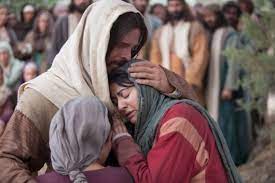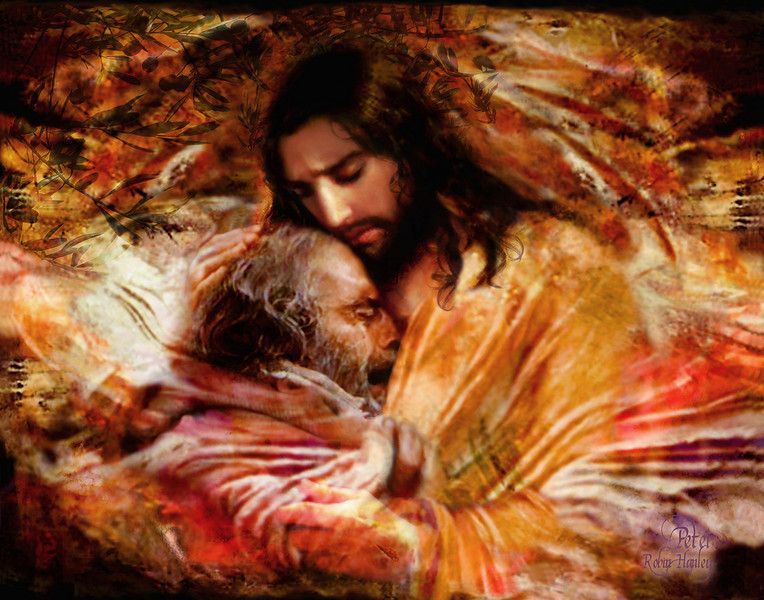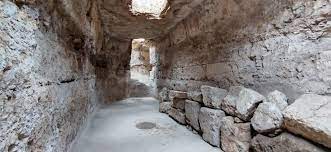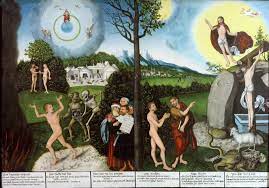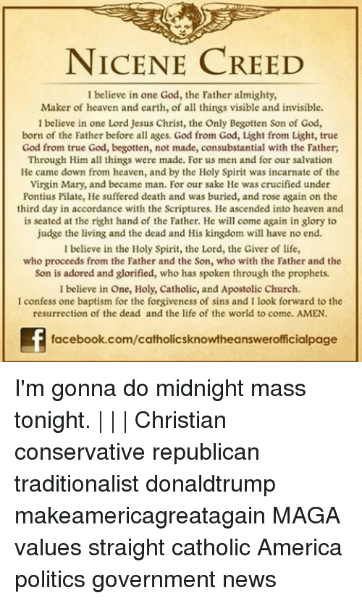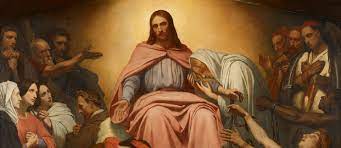The Holy Cross Cannot Be Found Wanting: Luther on Persecution and Martyrdom
While Luther believed the Christian’s final victory over death rested on Christ’s redemption through the cross, he taught that Christians would suffer trials, persecution, and possibly martyrdom in this world. He emphasized rightly the doctrine of justification by faith alone in Christ’s promise opposed to the late medieval idea that Christians earned merit through the imitation of Christ or the saints. However, Luther also taught that Christians do imitate Christ in response to the gift of faith. Specifically, God often called upon Christians to imitate Christ’s suffering through persecution and martyrdom. In fact, he stated that the preaching of God’s Word would bring persecution through the loss of property, family members, and various tribulations. For instance, in his explanation of the Third Petition of the Lord’s Prayer (Thy Will Be Done), he wrote:
“For where the Word of God is preached, accepted, or believed, and produces fruit, there the holy cross cannot be wanting. And let no one think that he shall have peace; but he must risk whatever he has upon earth-possessions, honor, house and estate, wife and children, body and life. Now, this hurts our flesh and the old Adam; for the test is to be steadfast and to suffer with patience in whatever way we are assailed, and to let go whatever is taken from us.” Large Catechism III. 65-66
When the persecution and martyrdom of Lutherans began in the early 1520s, Luther understood this to be the restoration of the true Christian life. The word of the true gospel causes offense and ultimately leads to opposition from those who seek to justify themselves through good works. Luther understood persecution and possible martyrdom to be the proper result of preaching the rediscovered gospel. For example, Luther explained to Hartmug von Cronberg (an early lay noble supporter of Luther’s teaching) that “Wherever Christ is, Judas, Pilate, Herod, Caiaphas, and Annas will inevitably be also, so also his cross. If not, he is not the true Christ.” (LW 43:63)
Luther stated that Christians should never search for suffering but only accept it in faith when it comes. While unbelievers oppose the preaching of the gospel, this same divine word consoles in desperate times and allows the believer to struggle against the devil and the world. Suffering molds believers into the likeness of Christ. Affliction and persecution increases faith and ultimately, “the gospel cannot come to the fore except through and in suffering and the cross.” (LW 51:197-208; quote on LW 51:207)
" Wherever you see or hear this, You may know that the holy Christian church is there, as Christ says in Matthew 5: 11-12, "Blessed are you when men revile you and utter all kinds of evil against you on my account. Rejoice and be glad, for your reward is great in heaven." This too is a holy possession whereby the Holy Spirit not only sancitifies his people, but also blesses them.
Martin Luther (LW 41:165)
The Seventh Mark: The Holy Cross
1. The whole Christian life is lived in relation to God. We confess the Triune God as 1) a prayer to the one who made us, 2) a definition of the true faith, and 3) a witness to the world.
2. Read and reflect on Luther's Small Catechism (CLC pp. 328-330) and Large Catechism (CLC pp 398-408) on the Apostles' Creed.
3. Read and reflect on the Nicene Creed and Athanasian Creed
(CLC pp. 15-18).
4. The life of the Christian is the life of self-denial for the sake of the Triune God. Read and reflect on Matthew 16: 24-26 ESV
Then Jesus told his disciples, “If anyone would come after me, let him deny himself and take up his cross and follow me. For whoever would save his life will lose it, but whoever loses his life for my sake will find it. For what will it profit a man if he gains the whole world and forfeits his soul? Or what shall a man give in return for his soul?
5. The life of the Christian is one of obedience. Read and reflect on Acts 5: 27-29 ESV
And when they had brought them, they set them before the council. And the high priest questioned them, saying, “We strictly charged you not to teach in this name, yet here you have filled Jerusalem with your teaching, and you intend to bring this man's blood upon us.” But Peter and the apostles answered, “We must obey God rather than men.
6. The life of the Christian is one of public witness. Read and reflect on Matthew 10: 16-25 ESV
Persecution Will Come.
“Behold, I am sending you out as sheep in the midst of wolves, so be wise as serpents and innocent as doves. Beware of men, for they will deliver you over to courts and flog you in their synagogues, and you will be dragged before governors and kings for my sake, to bear witness before them and the Gentiles. When they deliver you over, do not be anxious how you are to speak or what you are to say, for what you are to say will be given to you in that hour. For it is not you who speak, but the Spirit of your Father speaking through you. Brother will deliver brother over to death, and the father his child, and children will rise against parents and have them put to death, and you will be hated by all for my name's sake. But the one who endures to the end will be saved. When they persecute you in one town, flee to the next, for truly, I say to you, you will not have gone through all the towns of Israel before the Son of Man comes. “A disciple is not above his teacher, nor a servant above his master. It is enough for the disciple to be like his teacher, and the servant like his master. If they have called the master of the house Beelzebul, how much more will they malign those of his household.
7. The life of the Christian is one lived under the protection of Christ. Read and reflect on Revelation 7: 13-14. ESV
Then one of the elders addressed me, saying, “Who are these, clothed in white robes, and from where have they come?” I said to him, “Sir, you know.” And he said to me, “These are the ones coming out of the great tribulation. They have washed their robes and made them white in the blood of the Lamb.
8. Pray for the persecuted Church around the world that they may be strengthened.
9. Pray for the apathetic Church around the world that they may be led to bold proclamation and confession of the true faith.
From THE GUIDE Seven Marks Society Second Edition
Page references are from CONCORDIA The Lutheran Confessions Concordia Publishing House Second Addition, Copyright 2005,2006 (CLC)
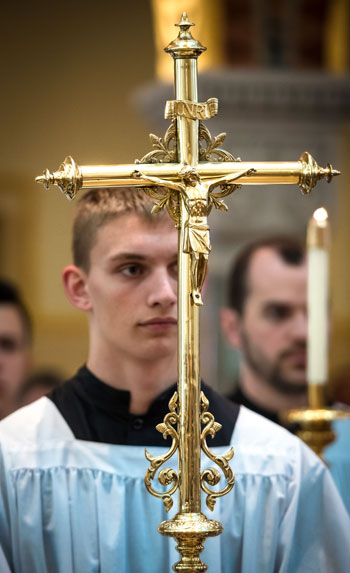
Lift high the cross
The love of Christ proclaim,
Till all the world
Adore His sacred name.
Led on their way
By this triumphant sign,
The hosts of God
In conquering ranks combine.
Refrain:
Lift high the cross
The love of Christ proclaim,
Till all the world
Adore His sacred name.
Each newborn servant
Of the Crucified
Bears on the brow
The seal of Him who died.
Refrain:
Lift high the cross
The love of Christ proclaim,
Till all the world
Adore His sacred name.
O Lord, once lifted
On the glorious tree,
As Thou hast promised
Draw the world to Thee.
Refrain:
Lift high the cross
The love of Christ proclaim,
Till all the world
Adore His sacred name.
So shall our song
Of triumph ever be:
Praise to the Crucified
For victory.
Refrain:
Lift high the cross
The love of Christ proclaim,
Till all the world
Adore His sacred name...
Author: George William Kitchin (1887)
Tune: CRUCIFER (Nicholson)
Athanasian Creed
Whoever wants to be saved should above all cling to the catholic faith. Whoever does not guard it whole and inviolable will doubtless perish eternally. Now this is the catholic faith:
We worship one God in trinity and the Trinity in unity, neither confusing the persons nor dividing the divine being. For the Father is one person, the Son is another, and the Spirit is still another. But the deity of the Father, Son, and Holy Spirit is one, equal in glory, coeternal in majesty. What the Father is, the Son is, and so is the Holy Spirit.
Uncreated is the Father; uncreated is the Son; uncreated is the Spirit. The Father is infinite; the Son is infinite; the Holy Spirit is infinite. Eternal is the Father; eternal is the Son; eternal is the Spirit: And yet there are not three eternal beings, but one who is eternal; as there are not three uncreated and unlimited beings, but one who is uncreated and unlimited. Almighty is the Father; almighty is the Son; almighty is the Spirit: And yet there are not three almighty beings, but one who is almighty.
Thus the Father is God; the Son is God; the Holy Spirit is God: And yet there are not three gods, but one God. Thus the Father is Lord; the Son is Lord; the Holy Spirit is Lord: And yet there are not three lords, but one Lord. As Christian truth compels us to acknowledge each distinct person as God and Lord, so catholic religion forbids us to say that there are three gods or lords.
The Father was neither made nor created nor begotten; the Son was neither made nor created, but was alone begotten of the Father; the Spirit was neither made nor created, but is proceeding from the Father and the Son. Thus there is one Father, not three fathers; one Son, not three sons; one Holy Spirit, not three spirits.
And in this Trinity, no one is before or after, greater or less than the other; but all three persons are in themselves, coeternal and coequal; and so we must worship the Trinity in unity and the one God in three persons.
Whoever wants to be saved should think thus about the Trinity.
It is necessary for eternal salvation that one also faithfully believe that our Lord Jesus became flesh.
For this is the true faith that we believe and confess: That our Lord Jesus Christ, God's Son, is both God and man. He is God, begotten before all worlds from the being of the Father, and he is man, born in the world from the being of his mother— existing fully as God, and fully as man with a rational soul and a human body; equal to the Father in divinity, subordinate to the Father in humanity.
Although he is God and man, he is not divided, but is one Christ. He is united because God has taken humanity into himself; he does not transform deity into humanity. He is completely one in the unity of his person, without confusing his natures. For as the rational soul and body are one person, so the one Christ is God and man.
He suffered death for our salvation. He descended into hell and rose again from the dead. He ascended into heaven and is seated at the right hand of the Father. He will come again to judge the living and the dead.
At his coming all people shall rise bodily to give an account of their own deeds. Those who have done good will enter eternal life, those who have done evil will enter eternal fire.
This is the catholic faith. One cannot be saved without believing this firmly and faithfully.
The Athanasian Creed from Lutheran Book of Worship (1978). Translation © 1978, Lutheran Book of Worship, admin. Augsburg Fortress.
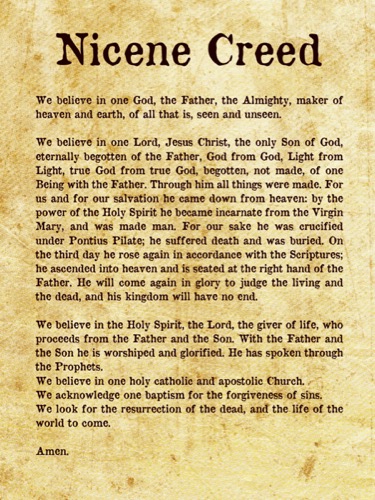
The Nicene Creed is a statement of belief widely used in Christian liturgy. It is called Nicene because it was originally adopted in the city of Nicaea by the First Council of Nicaea in 325. In 381, it was amended at the First Council of Constantinople, and the amended form is referred to as the Nicene or the Niceno-Constantinopolitan Creed.

